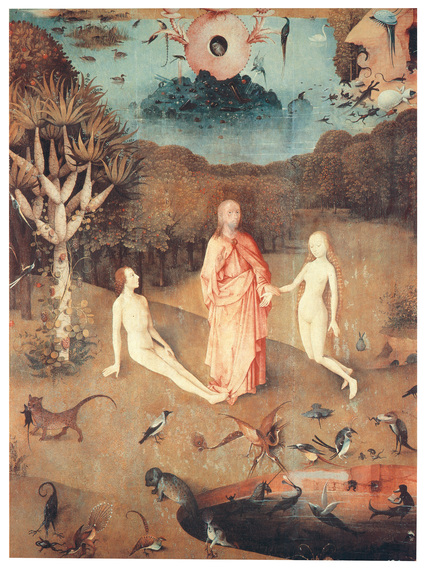Several myths of the origin of humankind have a touch of humor. The Pueblo Indians tell that Coyote once helped a great magician make people of clay, and bring them to life by baking them in a furnace. He left some undercooked, while others burned, and so most human beings are damaged to this day. Such tales seem to acknowledge that most of everyday life for human beings is defined by accidents rather than by some grand design.
The Biblical story of Adam and Eve, by contrast, has a stately majesty. The creation of the cosmos is a very purposeful, orderly affair, with a different task for each of six successive days. When Adam and Eve, at the instigation of the serpent, disobey a divine command, this is the first breakdown of the cosmic design. God is a gardener, and the first human beings are pests, a bit like whitetail deer nibbling at the flowers of a horticulturist today. Their expulsion is not so much a punishment as a practical step, designed to preserve divine harmony. Perhaps the defining theme of the story of humankind, as told in most of Western history, is homesickness for a lost paradise in which we lived in harmony with the natural world. But people viewed this loss ambivalently, often as a "fortunate fall," the first stage of emancipation from the violence and insecurity of the natural world, which might culminate in an existence as pure spirit.
Darwin's theory of evolution has provided another tale of human origins. As presented in most textbooks, at least until the late twentieth century, it retained most of the high drama of the Biblical account. Humankind became a bold fish, crawling out of the water, a bit like Columbus setting foot on the New World. The fins would gradually become arms, and the tail would become legs. It would learn to stand upright and, in time, rule the earth.
The triumphalist narrative made human beings so dominant that they ceased to be interesting. It was a sort of Horatio Alger story, in which a few twists of the plot might be novel but the basic progression and the ending were known in advance. Every new mutation, invention or cultural monument became a "step forward" for humanity. But the hero of this tale, however admirable s/he might seem, was not sufficiently vulnerable to inspire empathy. In addition, this narrative encouraged terrible feelings of guilt, confusion, and despair, for men and women could never live up to the expectations that it set.
Dissenters often retained the linear structure of this celebratory narrative, but made humanity the villain. Humankind, in other words, became a sort of Macbeth, stealing the throne of creation, and then murdering to retain it. There has always been a strong note of misanthropy running through Western culture. In Jonathan Swift's Gulliver's Travels (1735), the hero visits an island where horses are clean and civilized but people are filthy. When his equine hostess proposes the extermination of humankind, he does not object, and this self-loathing of human beings may be a driving force in history. We have edged close to exterminating ourselves a few times, and might yet succeed.
As scientists learn ever more about human evolution, it ceases to be a story at all, since any grand themes and patterns are lost in an enormous mass of detail. Many people today have almost no sense of a collective past, and it is as though the world we know in the twenty-first century had just appeared from nowhere. On a perceptual level, the evolutionist and creationist paradigms are not as different as we may sometimes think.
To tell the story of humanity, we must now address the question of what it means to be human, not as a biological or even a philosophic query but as a poetic one. The tale of humankind should be a romance filled with drama, uncertainty, tragedy, and humor. Let us laugh at the foolishness of human arrogance, but let us also feel the pathos behind that human foolishness. Our "Dominance" is just a fiction that we made up in order to feel less afraid; ants and jellyfish appear destined to outlive us. If man is the protagonist of our story, let that figure be intriguing yet fallible, fragile yet tough, in other words, truly "human."
Hieronymus Bosch, The Creation of Adam and Eve (detail of "The Garden of Earthly Delights"), c. 1505

